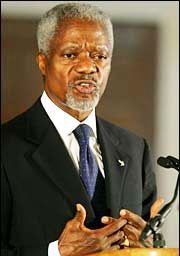US opposition to new rights council frustrates UN’s Annan
Mar 2, 2006 (UNITED NATIONS) — Secretary-General Kofi Annan said Thursday he was frustrated and disappointed at U.S. opposition to the proposed U.N. Human Rights Council and expressed hope that the U.S. will find a way of associating itself with the growing support for the new body.
 Annan’s comments came after the E.U. and Japan, which have close ties to Washington, added their backing for the new council to previous support from other U.N. members, human rights groups and a dozen Nobel Peace Prize winners.
Annan’s comments came after the E.U. and Japan, which have close ties to Washington, added their backing for the new council to previous support from other U.N. members, human rights groups and a dozen Nobel Peace Prize winners.
“I’m chagrined about the U.S. position,” Annan told reporters. “It does have a leadership and a moral position in this area, and I hope, as they move forward, it will find some way of associating itself with the other member states.”
“I don’t think we should see it as isolating the U.S., or the U.S. versus the others,” he said. “We are in this together.”
The council would replace the discredited U.N. Human Rights Commission which has been criticized for allowing some of the worst rights-offending countries to use their membership to protect one another from condemnation, or to criticize others. In recent years, commission members have included Sudan, Libya, Zimbabwe and Cuba.
The U.S. announced Monday that it would vote against the council unless the draft presented by General Assembly President Jan Eliasson was renegotiated to correct what it views as serious deficiencies, especially the chance that countries abusing human rights could become members.
U.S. Ambassador John Bolton reiterated Thursday that U.S. Secretary of State Condoleezza Rice had given instructions to try to reopen the text, or failing that to put off consideration of the issue for several months.
Based on U.S. consultations, Bolton said he shares Eliasson’s view that “there’s not much interest in opening the text up for further negotiations” which leaves the option of a delay, or a vote.
Eliasson said Wednesday that most U.N. member states had warned him against changing the proposal. “I never heard the world Pandora’s Box being so repeated,” he said.
The assembly president said he is in the midst of consultations and is still hoping to unite all 191 U.N. member states behind a resolution that would establish the new council before the Human Rights Commission meets in Geneva March 13.
Annan urged member states to think carefully about unraveling a proposed council that would replace the discredited commission.
“The bad must always give in to the good, but the better must not be the enemy of the good,” he said. “That is the advice I would want them to bear in mind as they attempt to settle this issue.”
An E.U. statement, obtained from a European diplomat, said the 25-nation body considers last week’s proposal by Eliasson to meet “the basic requirements for the establishment of a Human Rights Council.”
“The E.U. could therefore accept this text as a compromise,” the statement said.
Eliasson told The Associated Press he had been informed of the E.U.’s support. “That’s very good news. I’m very grateful for this support, and I hope we will move closer to taking a decision on this important matter,” he said.
Richard Grenell, spokesman for Bolton, reiterated the U.S. opposition to the proposal.
“The United States made its decision not to support the current draft based on the principle that we should not compromise when talking about human rights,” he said.
Eliasson said, however, “I can see grave difficulties with renegotiation, and I can see grave difficulties with changing the text, and therefore I would hope we will come to closure on this before the Human Rights Commission begins.”
But how Eliasson can achieve consensus without reopening the text remains an unanswered question – at least for the moment.
He again defended his proposal, saying “it constitutes the best basis for the continued work of human rights which … is the soul of the United Nations.” He has argued that it would strengthen the U.N.’s human rights machinery and toughen criteria for membership.
The U.S. had lobbied for a permanent Human Rights Council of 30 members chosen primarily for their commitment to human rights by a two-thirds vote of the General Assembly, to try to keep countries abusing human rights off.
Under the new proposal, the 53-member Human Rights Commission would be replaced by a 47-member Human Rights Council that would be elected by an absolute majority of the 191-member General Assembly – 96 members.
But Eliasson stressed that the draft would require every council member to “uphold the highest standards in the promotion and protection of human rights” and have their human rights record reviewed during their three-year term. Eventually, all 191 U.N. member states would face such scrutiny.
(ST/AP)
